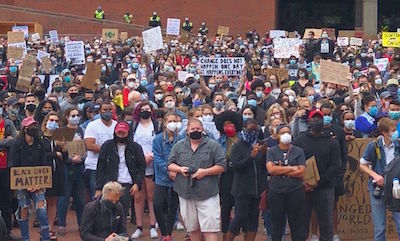The America I See Is Not the Same One My White Friends See.

This viewpoint originally appeared in BU Today. Viewpoint articles are written by members of the SPH community from a wide diversity of perspectives. The views expressed are solely those of the author and are not intended to represent the views of Boston University or the School of Public Health. We aspire to a culture where all can express views in a context of civility and respect. Our guidance on the values that guide our commitment can be found at Revisiting the Principles of Free and Inclusive Academic Speech.
“Can you please step out of the car?”
Those words are one of the most frightening things to hear as a Black man living in the United States. I’m not sure how many times I have heard them, but my heart still skips a beat every time I do. I remember one instance vividly: I was coming back from Pennsylvania State University with my cousins. We had just finished making the four-hour trip from State College, Pa., to Brooklyn, N.Y.—Canarsie to be exact—when we decided to grab some Funfetti cake for my cousin Adetayo’s birthday. We picked up another member of our family and off to Key Foods we went. On the way back to Adetayo’s house, I made a turn at a green light. Suddenly, we saw flashing lights behind us as two undercover officers pulled us over.
I slowly rolled down the window after making sure that everyone’s hands were visible because that was not the day that I was going to die. I said to the officer in a calm manner, “Excuse me, can you explain why we got pulled over?” No answer. The officer then proceeded to ask for our IDs. Next, he asked: “Are there any weapons in the car.” “No,” I replied. “Can we check the car to make sure?” he asked. “Why?” I said to the officer. “We just went to the store to buy some Funfetti cake.” Again, no answer. We were then asked to come out of the car and so we did. Minutes later, after being patted down, the officer said, “All set.” We entered the car and then they drove away.
我们
The Constitution states that all men are created equal, but protests across the country, spurred by the killing of George Floyd, an unarmed Black man, by white police officers in Minneapolis over Memorial Day weekend, reveal the hypocrisy in those words. Another man had been the victim of racial profiling, just like me, but this time, he lost his life. The whole nation watched as he was denied the right to breathe for 8 minutes and 46 seconds. We all listened as he called out for his mother to come help him.
This tragedy and the recent killings of other unarmed Black men and women, including Ahmaud Arbery, Breonna Taylor, Tony McDade, and Elijah McClain, has sparked a national uprising against systemic racism and police brutality. Police use of force is the sixth leading cause of death for young Black men. Black men are three times more likely than white men to be killed by police. In 2019, Black people accounted for 24 percent of those killed by police in the US, despite comprising only 13 percent of the population. In killings by police from 2013–2019, only 1 percent have resulted in officers being charged with a crime. And even if officers do face trial, they hardly ever get convicted.
We are facing two major public health crises in this country today: COVID-19 and systemic racism. The latter accounts for why COVID-19 is killing Blacks at a higher rate than whites, and the reason why Black men are being killed by the police at a higher rate than white men. If we want to truly address police brutality and COVID-19 in the Black community, we must dismantle systemic racism. To do that, we need to educate ourselves on the barriers of oppression that exist in this country and how they are designed to put us down. We need to organize into a collective movement, because we are stronger together than apart. Finally, we need to act. That’s arguably the most important step. Advocate for change and speak out against the injustices you see in your family, workplace, and community, but make sure you are also helping to support antiracist legislation and policies.
Th
Mayowa Sanusi (SPH’19) is a research associate with Health Resources in Action.
Comments & Discussion
Boston University moderates comments to facilitate an informed, substantive, civil conversation. Abusive, profane, self-promotional, misleading, incoherent or off-topic comments will be rejected. Moderators are staffed during regular business hours (EST) and can only accept comments written in English. Statistics or facts must include a citation or a link to the citation.